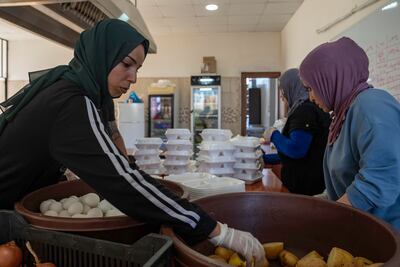Live updates: Follow the latest on Israel-Gaza
Municipal workers in the southern Lebanese city of Tyre say they have received countless phone calls urging them to leave ahead of expected Israeli air strikes. They watched last week as aerial attacks on nearby Nabatieh destroyed a municipal building co-ordinating humanitarian aid, killing 16 people, including the town's mayor.
But they are determined to stay put, saying the community needs their services. “We cannot leave our population during this difficult time. They need us. It’s a big responsibility ... we are all part of a united community,” Hassan Dbouk, 67, president of the Union of Tyre Municipalities, told The National from his office.
Since Israel escalated months of border skirmishes with Hezbollah into a full-scale war in Lebanon last month, historic Tyre has been largely depopulated. The once-vibrant streets are now eerily empty since Israeli shelling destroyed much of the centre. A deceptively calm sea borders the much-loved corniche, while collapsed buildings and burnt-out cars line the other side of the road.
Tyre's municipality building has not been hit directly by Israeli strikes but staff have been mourning the loss of four employees killed in a nearby air strike last month.
“Believe me, when you have good faith and you are convinced that it is your duty to help our people, especially during this difficult period, you feel an inner peace,” Mr Dbouk said.

He maintains a calm demeanour, his blue eyes not losing their spark despite explosions close by interrupting the interview with The National. He shrugs, saying loud explosions are part of daily life.
It is not Mr Dbouk's first experience of war. In 2006, he was also part of Tyre's municipal staff and stayed throughout the conflict. Today, the operation has effectively turned into a humanitarian centre for the estimated 10,000 people remaining in the city. This includes about 4,000 inhabitants and 6,000 displaced from border villages, some of which have been obliterated by months of conflict.
Eviction threats
The municipal buildings are filled with humanitarian aid: hygiene kits, mattresses and blankets distributed by UN organisations and Lebanon's Council for the South. The ground floor is bustling with volunteers. They are cooking hundreds of meals each day for shelters housing the displaced in Tyre. The menu featured eggs and potatoes.
“We hear the bombing but for now we’re safe here. Inshallah, it stays this way,” Monika Mhanna, 45, a volunteer displaced from a bombarded area of Tyre, told The National.
In Nabatieh last week, the Israeli army conducted its most devastating attacks on a Lebanese official building to date. The site was distributing humanitarian parcels. Mortada Mhanna, 47, the head of Tyre's Disaster Management Union, said staff were aware of the danger posed to their building.
As he spoke to The National, he received a call on his phone. A man on the other end, speaking in Arabic, said he was calling from the “Army of Defence”, the name used by the Israeli army. Everyone stopped working and stared tensely at Mr Mhanna, who put the call on speaker.
“For your safety and that of your family and all residents of the village, this is an urgent warning for the village residents. Hezbollah activities are forcing the Israeli Defence Forces to respond,” the man said. “All residents must evacuate north towards Al Awali river.”
The Awali lies about 60km from the Lebanon-Israel border, farther north than the Litani, which defines the northern boundary of a UN-designated buffer zone established after the 2006 war between Israel and Hezbollah.
Many other Lebanese have reported receiving similar calls. For Mr Mhanna, it was the second time he was contacted from the same Danish number in 24 hours. Civil defence workers in Tyre have already left their station after receiving similar eviction calls and are now staying at the municipality building.

The Israeli army has issued official warnings for dozens of villages in southern Lebanon, urging residents to leave their homes immediately. The UN has reported a quarter of Lebanon's territory has been affected by these warnings. Amnesty International has raised concerns of mass forced displacement.
“I will stay here, my family, with my people. This is my land. If we will die, we will die here,” Mr Mhanna said. “We are volunteers to serve the people.“
Sami Baredei, 67, has also decided to stay. With all economic activity in Tyre shutting down, he is relying on the municipality’s assistance.
Last week, a bomb landed close to his house, so he moved to a Christian neighbourhood near Tyre's port.
He said nowhere is safe, as the Israeli army does not distinguish between Christian and Muslim areas, but he vowed not to leave.
"My life is here. I was born here," he said. "Even with the strikes – and God protect us – it’s the most beautiful city."
